by Jenny Rose | Jun 8, 2024 | Connection & Community, Emotional Intelligence
My work team and I are always on the lookout for new ways to work with our pool patrons. We look for new moves and songs for water exercise classes and new ideas for working with swim lesson kids. 
A few weeks ago, a team member remembered an old book she’d seen titled The New Games Book. She remembered it as a resource for non-competitive games focused on play and teamwork rather than winning and losing, and we wondered if we could adapt some of the games to the water. I was interested, as I’m notoriously noncompetitive, to the point where a competition of any kind feels traumatic. Fortunately, we have a local librarian as a pool patron; she found a copy of the book. The copyright is 1976. The Dark Ages.
It is indeed filled with a variety of games, as well as black-and-white photos of people playing.
People playing. People in parks and other common outdoor areas, people of all ages, laughing, smiling, playing, and … touching. Dogs, too. It was like looking at a different world. I paged through the book, marveling, feeling sad about how much we seem to have lost. In the end, we concluded we couldn’t adapt any of the games to the water because they all involve touching.
We can’t adapt noncompetitive, team and community-building games for kids from this book because they all involve touching. It seems unbelievable.
I don’t blame the pandemic. It didn’t help matters, for sure, but social physical contact began to diminish before that. We’ve been gradually turning away from each other to look at screens for decades now, and as that’s happened social touch has become vilified.
When was the last time you went to the park to walk your dog (or just yourself), maybe with your kid(s), your mate, or a friend, met other people from your neighborhood there, and you all (dogs, too) played a silly game, or even something like frisbee?

Photo by Helena Lopes on Unsplash
Yeah. Me, too.
People play video games online together. My sons do that, one in Colorado and one in Montana. They’ve been doing it for years, even when they both lived in Colorado and could have gone to the park together.
Culturally speaking, we’ve never dealt well with touch. How could we in the context of patriarchy and rape culture? I’ve been raped, and I’ve been hit. I knew it wasn’t okay for a man to hit me, but at least it was some kind of touch. Believe me, I know how terrible that sounds, but I have always been so skin hungry because of infancy and childhood touch deprivation, even getting hit was better than no touch at all. It made me feel real. Blood and bruising are real. It made me feel alive – for a moment.
Can any of us be fully healthy without appropriate social touch? I know I can’t.
I have several friends who are uncomfortable with touch. Two were raised in the Catholic church, a fine patriarchal and shame-based system. One was sexually abused as a child.
Social touch is so complicated. How do we mandate appropriate touch? What do we do with adults who believe nonconsensual sexual contact with children is healthy and natural? How do we address boundaries, self-respect, sexuality, and family planning? What do we do about rape? How do we protect children whose parents believe physical abuse is the best way to discipline them? How do we know when it’s safe to touch someone and when it’s not? How do we incorporate the idea of consent back into our lives?
Now AI looms over us. Every day I read predictions about its influence, about those who are experimenting with it. I hear from people who predict AI is the end of all creative culture and people who believe it will support and nourish creativity.
One thing I know: No technological immersive experience, no matter how well crafted or engineered, can replace living, breathing physical interaction. Physical intimacy (not just talking about sex) is sensual – it involves all our senses, including the marvelous, taken-for-granted organ we call our skin. Human physicality is not a sterile algorithm. It’s not a porn film. It’s not filtered, airbrushed, photoshopped. A human being is a mass of contradictions, of scents, sounds, and textures. We’re unpredictable. We’re illogical. We’re beautiful and hideous, sacred and profane. Interacting in healthy, useful ways with other humans is challenging, offensive, and often dangerous. Also hilarious, fascinating and, increasingly, necessary if we want to survive. Human relationships are not fairytales, rom coms, TikTok videos, or roleplaying games.

Photo by Liane Metzler on Unsplash
I don’t believe we can make a substitute for human touch. Our bodies and perhaps our souls cannot thrive without it. Yet we are steadily eroding our ability to exchange or even recognize healthy touch, to the extent that the documented behavior of one of our most powerful political influencers is a clear demonstration of rape culture in action, and his followers, many in the top tiers of power, either don’t care or actively support his misogyny.
Touch, like climate, like food, like political systems, is unbelievably complex. At the same time, we must have a planet that supports our physical needs, we must eat to live, and unless we’re the last person on the planet we must figure out how to make decisions with others. If we don’t do those things, our species will die. Life and death as a binary are not complex at all.
If we lose touch, how much meaning, pleasure, and health will we lose from our lives? As our ability and willingness to exchange appropriate touch diminishes, are we healthier and better connected or increasingly divided and unhealthy? Note the present mental health crisis among young people. Most agree enforced isolation during the pandemic did not support our social needs, especially the health and development of children. At the same time, we deliberately and cheerfully offer ourselves every day to technology that actively and purposefully isolates us from living, breathing, face-to-face interaction with the physical world and other people without even noticing.
When I try to imagine a world without the feel of my cats, the earth and plants outside my window, supple bread dough rising in its greased bowl, the laptop keys under my fingers, a cup of hot tea between my hands, cool water against my body as I swim, the energetic little bodies of children I teach to swim, and all the other countless things I touch each day, I can’t. I don’t want to. My brain might be fooled by an immersive AI experience, but it’s hard to believe my body could ever be nourished and satisfied by one.
As I was thinking about this post, I came across an essay from a poet I follow on Substack, Anagha Smrithi, titled “In the Age of AI, Poetry Matters More Than Ever.” In it, she wrote:
“Our hands need something to hold onto. Our fingers need something to touch.”
I’m glad it’s not just me who values touch.
Questions:
- How do you feel overall about human touch?
- Who in your life are you able to exchange healthy touch with?
- Do you prefer your social life to be online or in person?
- What’s a favorite tactile sensation or texture?
Leave a comment below!
To read my fiction, serially published free every week, go here: 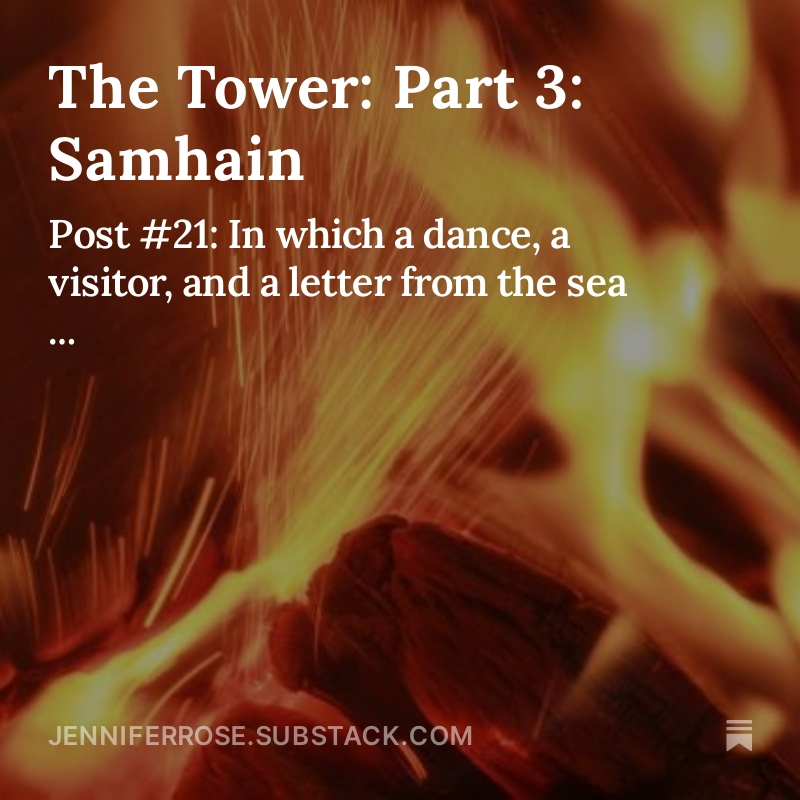
by Jenny Rose | Aug 16, 2018 | Power

Photo by Anna Dziubinska on Unsplash
It’s easy these days to feel overwhelmed and despairing. Life is increasingly unpredictable and the future uncertain socially, economically and in terms of climate. We’ve never before been able to discuss so many issues with so many others, or been exposed to so many different sources of information and opinions. As our public education system flounders, fewer and fewer people think critically, which is daily becoming a more important tool in navigating our information overload.
I heard about a comment the other day on social media directed toward someone discussing women’s rights. The man commenting asked why we’re talking about something like feminism when climate change is so pressing. Why are we wasting energy on women’s rights while the planet is getting more and more difficult to inhabit, not in some hazy future but right now, today?

Photo by Nicole Mason on Unsplash
That question points to the reason we find ourselves in our present situation in the first place. Our social struggles reflect our approach to living on and with our planet. The thinking shaping our social behavior is the same thinking shaping our behavior as citizens on Planet Earth. If we feel we’re entitled to rape, rob or otherwise seize power and control over another human being or group of human beings, we feel equally entitled to use the planet however we want, with no thought of anyone else or the consequences of our behavior. This fertile, life-giving planet is our mother. We live on her body. The degree to which we respect and appreciate her is the degree to which we afford the same treatment to women. It’s the same discussion. It’s not a coincidence that the increasing pressure on our physical survival is happening in the middle of the current social maelstrom.
I’m not a scientist, though I endeavor to be a critical thinker. However, I’ve done quite a bit of reading on the subject of complex systems and earth systems science, including Darwin’s Unfinished Business by Simon Powell, Animate Earth by Stephan Harding, Overshoot by William Catton and Gaia’s Revenge by James Lovelock. Everything I read confirms what I intuitively recognize.
Everything matters. Everyone matters. It’s all connected.
The days are gone when we can tell ourselves what happens on the other side of the world doesn’t affect us and we need not pay attention or worry about it. We have so far exceeded the earth’s carrying capacity for our species that the actions of each individual have an effect on the whole. As human population oozes and bulges into every biome all over the globe, we also directly affect every other form of life: Animal, plant, insect, fungi and microorganism. We displace other species, poison their habitat and compete fiercely for resources. We have no sense of our own needs or the needs of others, but focus on what we want, and we want it all — right now. We deserve it. We have a right to it.
Certain groups of men have no intention of sharing power, dignity and economic resources with women, let alone sharing the planet with fungi and Monarch butterflies. Some groups would eradicate cattle from the globe before learning how to integrate them back into the healthy complex system they were part of until we threw things out of balance with our numbers and ignorance. Others work to bar immigrants, saying they’ll take our jobs, they’ll soak up social resources and they’ll poison our communities with their foreign tongues and culture, too ignorant and short-sighted to grasp we are only enriched and strengthened by the presence of other cultures.
It’s all the same discussion. It’s all connected.

Photo by NASA on Unsplash
We are only now beginning to glimpse the miraculous web of life on Earth, only now getting a sense of Earth as a sentient complex system, self-regulating and self-sufficient, and the knowledge may have come too late. Complexity is life. Complexity is resilient and creates the ability to learn and adapt. Any behavior or ideology seeking to minimize, disrupt, or eradicate complexity is destructive. Those who work for purity, for homogenized patriotism, for the complete power of one religion, sex, diet, complexion, body type or expression of sexuality are actively tearing apart our world and our future.
Our inability to live peacefully and cooperatively with one another is our inability to respect and care for the land under our feet. Our willingness to tolerate slavery, sex trafficking and bureaucracy that destroys families, indigenous groups, human rights, reproductive choice and other natural resources is the same willingness to worship the false idol of money, buy whatever we want when we want it and discard it later with impunity. If we can’t buy what we want, we take it, or steal it. This is the definition of rape culture.
Complexity is about integration. One way to interpret the old stories is to consider each character as a separate part of the same psyche. In other words, we all have an innocent Red Riding Hood maiden inside us, and we all have an old bedridden grandparent, a parent who warns us of the dangers of leaving the path, a wily predator and a heroic figure who saves the day. A healthy adult learns to know and accept his or her shadow side, as well as more admirable characteristics. Spiritual wholeness consists of a well-balanced masculine and feminine, no matter our biological sex. If we are unable to integrate all these voices and archetypes, all these facets of personality, feelings and thoughts, and operate as a whole complex psyche, we’re crippled, and we’re certainly going to be unable to take our place as an effective, joyous and elegant part of the wider complex system of Planet Earth.
So yes, it matters. It matters if you use a plastic straw and throw it away. It matters if you toss your plastic cup out the car window. It matters if you support the tobacco industry because they’ve successfully addicted you. If you throw one less item away today, it matters. If you recycle and compost, it matters. If you stop rototilling your garden, which damages the soil, it matters. The way you treat the people and animals around you matters. We don’t have the power to stop or change the enormous transition we’re caught up in by ourselves. We may never see validation, recognition or negative consequences for the choices we make, but those choices do matter, because we’re all inextricably connected, like it or not, deny it or not.
Megastorms matter. Lead in drinking water and cancer clusters matter. Water conservation efforts in Cape Town matter. Antibiotic-resistant bacteria matter. Fires, earthquakes and volcanic activity matter.
People matter, too. Our experience, feelings and thoughts matter. I don’t matter more than you or anyone else, but, as a living creature on the planet, I matter. The way I treat myself matters. My health matters, and my creativity, and my ability to learn.
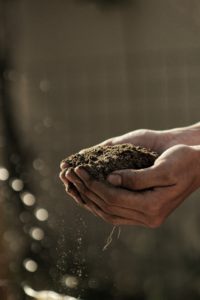
Photo by Gabriel Jimenez on Unsplash
If we can’t wrap our heads around the essential value and importance of each life, including our own, and support each individual in their personal power, we will absolutely destroy all non-human life on the planet and ourselves with it. If we’re really serious about equal rights, we need to learn to share our rapidly diminishing resources, and I don’t mean cars, technology and food delicacies grown half a world away. I don’t mean diamonds, designer clothing, private airplanes and yachts, and mansions housing a family of four. I mean basic food, clean water and habitable land. We each need to take responsibility for our addiction to instant gratification, convenience and all the latest tech, toys and trends. We need to let go of our entitlement and work together to create a sustainable standard of living for everyone.
So yes, food and water politics, sexual identity politics, human rights, healthcare, education, families and children and immigration all matter. They’re all road signs and mile markers. The question is whether we’ll travel in the direction of destruction or use these issues as opportunities to build bridges, enlarge our empathy and heal our disconnection from ourselves, from other humans, and from all other life, paving the way to managing climate change as elegantly as possible.
I know what direction I’m going in, not with hope of reaching some kind of utopia, but because it’s the only direction that makes any sense to me. Many, many people disagree with me, I know, and I’m going to have to fight the mob going in the direction of destruction. That’s okay. I never seem to be traveling in the direction of the majority, so I’m used to it, and there will be others going my way.
In the meantime, I walk the tightrope suspended over the paradox at the heart of modern life. I fight to maintain power and authority in my own life and use it for the greater good as well as my own benefit. At the same time, I acknowledge I am but one life among uncounted living beings on the planet, spinning through space with everyone else towards an uncertain future. My power is present, but limited. If I make even the smallest difference for good in my lifetime, I’ll probably never know, and no one else will ever see, and that’s okay with me.
It still matters.
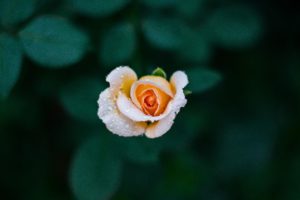
Photo by Ivan Jevtic on Unsplash
All content on this site ©2018
Jennifer Rose
except where otherwise noted
by Jenny Rose | Dec 1, 2017 | A Flourishing Woman, Self-Love
Relationship is the finest crucible I know for personal growth and transformation. Unfortunately, it’s also the best crucible for abuse and destruction, but I no longer focus on that aspect of connection with others. My relationships now are based on growth, not destruction. I have promised myself this.
As my partner and I slowly move toward shaping a life of self-sufficiency and holistic collaboration with our land and community, we are experiencing (naturally) many unwelcome pauses and fallow periods as we wait on favorable weather, the scheduling needs of others or the availability of funds.
I’ve noticed during these frustrating pauses my partner serenely deals with the work of the day and then is perfectly happy to sit on our sagging couch, a book in one hand, the TV remote in the other and the cat velcroed to him, occasionally getting up to feed the wood stove.

Photo by Lilly Rum on Unsplash
It drives me nuts. How does he do that?
We had a conversation about it over breakfast recently.
He’s hanging out and waiting for the stars to align so we can begin to move forward again. That might come in the form of some income, a phone call, a stretch of really warm days, or who knows what other miracles. He figures it will all work out, one way or another, in time, and meanwhile he might as well relax and enjoy life.
I, on the other hand, from my earliest memory, make Deals with the Universe. My Deal is that I’ll Be Good in order to get what I need to survive. Being Good is specifically defined.
- I will not complain, whine, want or need anything I don’t have.
- I will hoard what I do have and be grateful, because I have so much more than many others.
- I will work as hard as I can at all the tasks that can be done right here, right now, even if it’s only scrubbing the kitchen floor on my hands and knees or cleaning out closets.
- I will not wait, hope, dream. I will act. Now!
- I will not make excuses, procrastinate or (God help us) relax.
- I will never admit to feeling afraid or anxious or impoverished in any way. Being truthful about our experience is “airing dirty laundry,” which is shameful and vulgar.
Somewhere inside me is a hysteric who knows my partner is wrong. Sitting on the couch means he’ll never see his dreams come true. He won’t deserve to see dreams come true, because he’s not doing anything to help himself, to prove himself worthy of good things. He’s not hoarding what we have. He’s got a light on for reading and the TV on and he’s putting wood in the stove as though those six cords out in the barn will last all winter! (They will.) He’s not doing all the tasks that could be done. He’s failing the test, failing his side of the deal, and we are screwed.
All this panic and fear impel me to work harder and harder at everything. At anything. I must demonstrate to the Universe that I’m not a slacker, a sponge, an ingrate. I must also make up for his blasphemy of sitting on the couch, because we hold dreams in common, and we can’t manifest the lives we want without each other. Clearly, I must Be Good for both of us.
The infuriating but inescapable truth is that I can’t honestly say my Deals with the Universe work better than my partner’s approach. I’ve always had what I’ve needed to survive, but so has he!
It’s not fair.
Then, this last week I read the best essay I’ve come across on rape culture and its effect on women. The writer perfectly expresses much of my longing and the difficulty of allowing oneself to be fully and powerfully female. I feel more and more tension around this in our climate of hysterical political correctness, labeling, jargon and sloppy thinking. The increasing visibility of symptoms of rape culture give me hope that in some quarters there is a will to change, but will it be enough? Will we ever really see an equal playing ground for all people? Not necessarily the same playing ground, but equal in contribution and value, equal in respect, resource and power?
I don’t know.
Anyway, I went for my morning walk with the essay on rape culture and my Being Good rules rattling around in my head. There were snowflakes in the air under a mostly cloudy cold sky with occasional gleams of sun. The river flowed quietly along and I sat for a while under the trees to watch the snow fall in the water.

Photo by Joshua Fuller on Unsplash
What if, I wondered, instead of my exhausting and not-notably-effective list of what Being Good entails, I changed my Being Good Deal with the Universe to living the truest and fullest expression of myself possible? What if that included the entirety of my wants, needs, feelings, thoughts, creativity, passion, power and sexuality? What if that included all the great and small activities and experiences that give me pleasure? What if I gave my obnoxious, persistent and compulsive judgement a sabbatical, with an option for permanent retirement?
I was so intrigued by this that I’ve been playing with it for the last few days. In that time my laptop developed technical problems and is in the shop, so I’ve been without my usual habits, tools and routines. This post was not published first thing Thursday morning. I notice that life manages to continue in spite of it. I’ve read, walked, laid on my back on the ground in the sun, meditated, gone swimming and luxuriated in a hot therapy pool, done Tai Chi and ordered my favorite body oil. I’ve listened to Christmas music. I’ve eaten a bowl of ice cream. I’ve had an honest conversation with two women I like and admire. I’ve taken walks with my partner. This looks much like my usual life, it’s just that currently I’m allowing myself to enjoy my experience without shame, expectation or judgement.
Life is a lot easier and much more fun under my new (and simplified) Be Good Deal with the Universe. Will the Universe frown or smile upon this new Deal?
Who knows? Maybe it’s none of my business. Maybe the Universe isn’t looking over my shoulder, recording every action and thought, maintaining a cosmic scorecard. Maybe the Universe is sitting on the couch, alternately reading science fiction and watching reruns of Star Trek on Syfy and paying absolutely no attention to me whatsoever, and all my frenzied flapping around is just a waste of energy.
Sometimes I make myself tired.
I think I’ll go sit on the couch.

Photo by Josh Applegate on Unsplash
All content on this site ©2017
Jennifer Rose
except where otherwise noted
by Jenny Rose | Sep 28, 2017 | Connection & Community, Emotional Intelligence
When I was pregnant with my first son in 1989, I approached parenthood the way I approach every new endeavor. I read whatever I could get my hands on. I had a shelf of books on pregnancy, labor and delivery, breastfeeding and parenting. Like most parents, I wanted to be the best I could possibly be.
Twenty-five years later that I came across the only book I needed, a simple paperback I’d never heard of or seen, a book never mentioned by health professionals, teachers or anyone else. The book was The Continuum Concept by Jean Liedloff. It only took me a couple of days to read, and I cried through the whole thing. I’ve rarely read a book that so completely captured my private longings and sense of being broken.
By then, of course, it was far too late to apply the information as a parent.
As I embark on the second half of my life, I think about the continuum concept every day. I grieve for us all, victims of rape culture, many of us broken and maimed sexually, physically, mentally and emotionally. Few of us have any idea what a healthy human relationship looks like, and fewer still know how to go about creating and participating in one, or are in fact able to because of the damage current parenting practices and other social norms cause.
My own needs for affectionate, nurturing touch and in-arms experience are chronically unmet and over the years I’ve learned to spend time in water, in the sun, with animals and in nature as substitutes for human contact.
The trees and forests here are nothing like the pine and aspen forests I knew growing up in Colorado. The broadleaf forests in Maine are tall and deep and thick, every layer incredibly rich and complex. The trees are a mix of fruit, evergreen and hardwood such as birch, beech, oak, ash and maple, to name but a few.
Over the months, as I’ve walked this place and made friends with it, I notice a thing about this forest.
The trees die in one another’s arms.
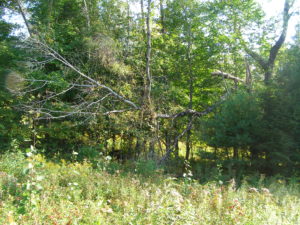
Orchard Field
Trees of all ages grow here. Older, damaged or weak trees begin to lean and die. They can remain standing in death, becoming snags for wildlife and insects, or rot from the inside out and the roots up with the help of fungi and moss. These can be pushed over with one hand, and as they fall they collapse wetly into pieces, releasing the woody smell of mushrooms. Smaller trees can sometimes find a way to fall all the way to the ground, especially at the edges of forested areas or along the river, but the huge old trees away from the edges have no room to fall entirely. They might drop branches or break at various points up the trunk, but the whole tree can’t come down at once.

Die in my arms 09/27/17
All over this 26 acres old trees are leaning, dying or dead, held in the arms of their healthy, living neighbors. Some neighbors of the same species are no doubt family members, but it doesn’t matter. A tall, strong ash might hold an old beech, or a maple support the skeleton of a pine.
This is not a dutiful, quick, can’t-wait-to-get-it-over-with embrace, but a years-long in-arms relationship while the dead tree rots and breaks down, feeding its patient supporter and the rest of the forest, until the moment comes when the last of its body decays enough to fully rest on the ground where it was born.
The forest grows together, lives together and dies together.
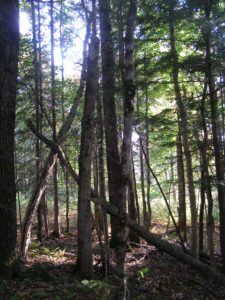
Die in my arms 09/27/17
Yesterday morning I went out to clear around an old shed we plan to put a foundation under and use. At one time there was an arbor along the south side of the building that supported a grapevine. The arbor is long gone now, and the sprawling grapevine is as thick as my wrist in some places and has spread over an area of about 50 square feet. I went to work, lopping saplings and woody growth and pruning the rest. The vine had produced some purple grapes as it crawled up the shed wall. I’ve never tasted a grape with such intense flavor, but there weren’t many. I wondered if we built a temporary trellis and I gave it some attention we might be able to take cuttings and save it. If it can survive years of neglect and still fruit, it seems to me it’s happy here.
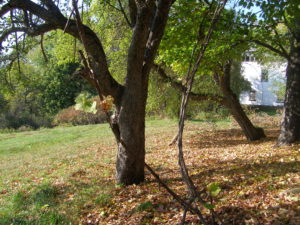
Apple and grapevine 09/27/17
I worked away until I came to the foot of an old apple. This tree is gnarled and twisted, as they often are, and the entire trunk is hollow from below eye level to my highest reach with several entrances and exits. This particular apple is early, and the fruit has mostly dropped and been eaten by wildlife. As I knelt under the tree, cutting back woody undergrowth, I looked up.
The grapevine, having no trellis to climb on, had over the years climbed the tree instead, and pounds and pounds of purple grapes hung down from the apple tree canopy, invisible unless you stand right under the tree.
Die in my arms, I thought, looking up in wonder. Live in my arms. Flourish, shelter and fruit in my arms.
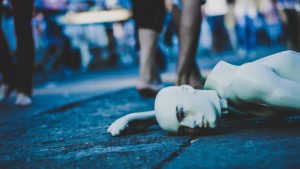
Photo by Edu Lauton on Unsplash
Trees are not people. Clearly, people are not trees. We have demonized the continuum concept. We have civilized ourselves into cities of concrete and steel, hospitals, institutions and prisons. Touch in our culture is about rape, violence, abuse, capitalism and control. The need and desire to give and receive touch is viewed as inappropriate and dangerous. We’re addicts, homeless, outcast, broken, sick and lonely. We’re divided from one another, competitors and enemies. Few of us will die in anyone’s arms.
No, people are most certainly not trees.
All content on this site ©2017
Jennifer Rose
except where otherwise noted
















